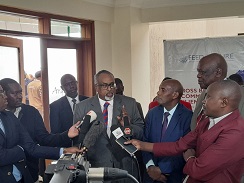By Yeneneh Sisay / Kenya – The East African Intergovernmental Panel on Development (IGAD) Center for Lowland and Pastoral Areas (ICPALD) held knowledge sharing consultation in Kenya this week.
Held from May 27 and 28, 2024, in Nairobi, Kenya, IGAD’s “knowledge sharing cross border community resilience” (CBCR) discussion was attended by experts from member countries and representatives of associations working in the field of animal resource development.
Pastoralists held a two-day exchange of experiences on how to adapt to drought conditions without harming their animals. Agents of pastoral communities from Ethiopia, Kenya, South Sudan, Uganda and Somalia and consultants from institutions leading the sector shared solutions that they said would be beneficial to the problem.
“There is a need to change the lives of the people of the border community and make them cooperate,” said IGAD Deputy Executive Director Mr. Mohammed Abdi Wareh in his opening speech. In order to prevent climate change and other impacts on the pastoral community, intellectual cooperation and reflection should be done together in the member countries, according to scholars who presented a research paper and pastoralists who shared their life experiences.
Dr. Amha Sebsbe, Animal Resource Development Adviser at IGAD, explained that the pastoralists living in lowland areas cannot prepare enough fodder for their animals due to the lack of rain, so the cooperation of countries and the life experience of the pastoralists need to be made good use of.
Dr. Amha told reporters that the pastoralist gets the fodder he uses for his animals mostly from the grazing land, and the land is not able to produce because the land is not able to produce.
Dr. Amha explained that in order to find a solution to the problem, there should be research-based cooperation. The expert said that pastoralists should be market-oriented and in addition to livestock trade between IGAD member countries, they should also look at the markets of Middle Eastern countries.
During the two-day exchange of experience, IGAD ipcal consultation, where several solutions were proposed regarding the development of animal fodder and what should be done to prevent the herdsmen from losing their animal resources during drought, it was said that it is necessary to pay attention to the sale of animals by knowing the weather forecast in advance, as it saves the entire animal resources from being lost.
Livestock resources of IGAD member countries account for 12% of the global share, but it can be seen at various times that pastoralists in lowland areas who produce fodder for their animals are dependent on rain instead of benefiting as much as they deserve.
A large number of pastoralists, cooperatives, community representatives and government representatives invited from the member countries attended the two-day experience exchange consultation in Nairobi, Kenya. It was announced that USAID organized the consultation in collaboration with IGAD.

